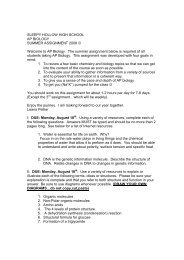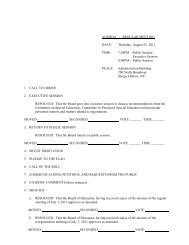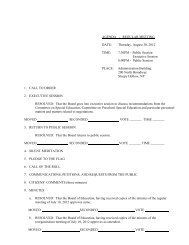Remembering Who We Are: Observations of a Southern Conservative
Remembering Who We Are: Observations of a Southern Conservative
Remembering Who We Are: Observations of a Southern Conservative
Create successful ePaper yourself
Turn your PDF publications into a flip-book with our unique Google optimized e-Paper software.
370 ISSUE16/ WasAbraham Lincoln America'sGreatestPresident?<br />
simple economic terms the South's hostile reaction to anti-slavery proposals.<br />
To that blunder he added the related mistake <strong>of</strong> attempting to end the "rebellion"<br />
with the same sort <strong>of</strong> simplistic appeals to the prospect <strong>of</strong> riches. Or with<br />
fear <strong>of</strong> a servile insurrection brought on by his greatest "war measure," the<br />
emancipation <strong>of</strong> slaves behind <strong>Southern</strong> lines, beyond his control. A full-scale<br />
<strong>Southern</strong> revolution, a revolution <strong>of</strong> all classes <strong>of</strong> men against the way he and<br />
some <strong>of</strong> his supporters thought, was beyond his imagination. There was no<br />
"policy" in such extravagant behavior, no human nature as he perceived it.<br />
Therefore, on the basis <strong>of</strong> my understanding <strong>of</strong> his overall career, I am compelled<br />
to agree with Charles W. Ramsdell concerning Lincoln and his war.<br />
Though he was no sadist and no warmonger, and though he got for his pains<br />
much more <strong>of</strong> a conflict than he had in mind, Lincoln hoped for an "insurrection"<br />
<strong>of</strong> some sort-an "uprising" he could use.<br />
The "rational" transformation <strong>of</strong> our form <strong>of</strong> government which he had<br />
first predicted in the "Springfield Lyceum Speech" required some kind <strong>of</strong> passionate<br />
disorder to justify the enforcement <strong>of</strong> a new Federalism. And needed<br />
also for the voting representatives <strong>of</strong> the South to be out <strong>of</strong> their seats in the<br />
Congress. It is out <strong>of</strong> keeping with his total performance as a public man and<br />
in contradiction <strong>of</strong> his campaigning after 1854 not to believe that Lincoln<br />
hoped for a <strong>Southern</strong> attack on Fort Sumter. As he told his old friend Senator<br />
Orville H. Browning <strong>of</strong> Illinois: "The plan succeeded. They attacked Sumter-it<br />
fell, and thus did more service than it otherwise could." And to others he<br />
wrote or spoke to the same effect. If the Confederacy's <strong>of</strong>fer <strong>of</strong> money for<br />
Federal property were made known in the North and business relations <strong>of</strong> the<br />
sections remained unaffected, if the Mississippi remained open to Northern<br />
shipping, there would be no support for "restoring" the Union on a basis <strong>of</strong><br />
force. Americans were in the habit <strong>of</strong> thinking <strong>of</strong> the unity <strong>of</strong> the nation as a<br />
reflex <strong>of</strong> their agreement in the Constitution, <strong>of</strong> law as limit on government<br />
and on the authority <strong>of</strong> temporary majorities, and <strong>of</strong> revisions in law as the<br />
product <strong>of</strong> the ordinary course <strong>of</strong> push and pull within a pluralistic society,<br />
not as a response to the extralegal authority <strong>of</strong> some admirable abstraction<br />
like equality. In other words, they thought <strong>of</strong> the country as being defined by<br />
the way in which we conducted our political business, not by where we were<br />
trying to go in a body. Though once a disciple <strong>of</strong> Henry Clay, Lincoln changed<br />
the basis <strong>of</strong> our common bond away from the doctrine <strong>of</strong> his mentor, away<br />
from the patterns <strong>of</strong> compromise and dialectic <strong>of</strong> interests and values under a<br />
limited, Federal sovereignty with which we as a people began our adventure<br />
with the Great Compromise <strong>of</strong> 1787-1788. The nature <strong>of</strong> the Union left to us<br />
by Lincoln is thus always at stake in every major election, in every refinement<br />
in our civil theology; the Constitution is still to be defined by the latest wave<br />
<strong>of</strong> big ideas, the most recent mass emotion. Writes Dietze:<br />
Concentrations <strong>of</strong> power in the national and executive branches <strong>of</strong><br />
government, brought about by Lincoln in the name <strong>of</strong> the people,<br />
wereprocessesthat conceivably complemented each other to the detriment<br />
<strong>of</strong> free government. Lincoln's administration thus opened the<br />
way for the development <strong>of</strong> an omnipotent national executive who as

















